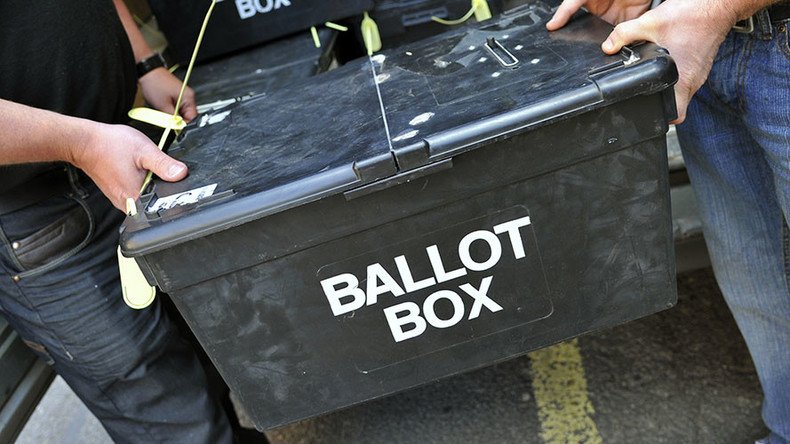Is British democracy broken? Election monitors issue damning verdict on 2017 vote

British democracy needs a dramatic overhaul following this year’s “hold your nose” general election that saw 6.5 million people voting tactically rather than for what they truly believe in, the Electoral Reform Society (ERS) has said.
Its new research - The 2017 General Election Report - offers a damning analysis on the first-past-the-post electoral system (FPTP) under which the party that gains the most MPs, rather than the most votes overall, wins.
June’s general election, in which Tory party leader Theresa May lost her Commons majority, saw an apparent return to two-party politics as more than 80 percent of voters cast a ballot for either the Conservatives or Labour.
The ERS insists this was driven by tactical voting, with one in five voters casting their ballot to defeat the candidate they opposed.
22mn didn’t count
Around 22 million votes cast in the election had no impact on the overall result, due to the winner-takes-all nature of the “broken” FPTP system.
Under FPTP, a candidate standing in a constituency must receive a larger number of votes than all other candidates to win, and votes cast for other candidates are effectively binned, regardless of the size of the margin of victory.
Breaking: 68% of votes had no impact on the General Election result – 22 million votes were wasted https://t.co/xAerV1Ygjw
— Electoral Reform Soc (@electoralreform) August 21, 2017
For example, in Barrow and Furness, Labour’s John Woodcock defeated Tory Simon Fell by just 209 votes, receiving 22,952 compared to Fell’s 22,383. However, FPTP means the votes Fell received had no impact.
Five constituencies saw more than 90 percent of votes make no difference to the outcome, the ERS said.
Tactical voting
According to the research, 6.5 million people felt compelled to vote tactically, rather than for their first choice. Britons had been forced to “try and game the system,” the ERS said.
We estimate that 6.5m people voted tactically in June's election, due to Westminster's broken voting system https://t.co/xAerV1Ygjw
— Electoral Reform Soc (@electoralreform) August 21, 2017
They highlighted a growth in tactical voting websites, such as SwapMyVote, as Britons tried to find a constituency “where their choice would actually matter.”
Under Westminster’s voting system, elections are more like lotteries. Tiny swings change major outcomes https://t.co/mzibqbDe6t
— Electoral Reform Soc (@electoralreform) August 21, 2017
The ERS found Prime Minister May could have avoided her general election calamity and kept hold of the Tories’ majority in the Commons if just 0.0016 percent of voters had chosen differently.
“A working majority could have been achieved on just 75 additional votes in the right place,” the report said.
Darren Hughes, the Electoral Reform Society chief, said: “With an estimated 6.5 million people holding their nose at the ballot box, voters have been denied real choice and representation.
“This surge in tactical voting - double the rate of 2015 - meant voters shifted their party allegiances at unprecedented rates.
“Tiny shifts in the vote result in drastically different outcomes. Having results hinge on a few hundred voters is no way to run a modern democracy.”
Corbyn could be PM
Labour leader Jeremy Corbyn could today be Britain’s prime minister if the nation had ditched FPTP and introduced the proportional voting system used in Scotland and Northern Ireland.
The ERS report says Labour would have won the largest number of seats had the single transferrable vote (STV) system been used, with Labour winning 297 and the Tories 283.
The result would have paved the way for Corbyn to enter Downing Street as either the leader of a minority government or perhaps a Labour-led coalition.
Under an Alternative Vote (AV) system, a method of proportional representation rejected by the British public in a 2011 referendum, the Tories would have lost 13 seats and Labour gained 24 compared with the actual result.
Scottish & Welsh votes ‘wasted’
Up to 1.8 million Scottish votes were “wasted” in June’s general election because they had no impact on the result, the ERS study claims.
Under FPTP, Labour won 27 percent of the votes cast in Scotland, but got just 12 percent of the seats, while the Scottish National Party (SNP) won 27 percent of the votes cast but returned almost 60 percent of the seats.
The report also said Scotland is “shifting back towards multi-party politics.”
Likewise, more than a million Welsh votes were “wasted” in the election, the ERS added.
Labour won 70 percent of the seats in Wales in 2017 from 48.9 percent of the vote, while the Tories increased their share of the vote despite losing three seats.












